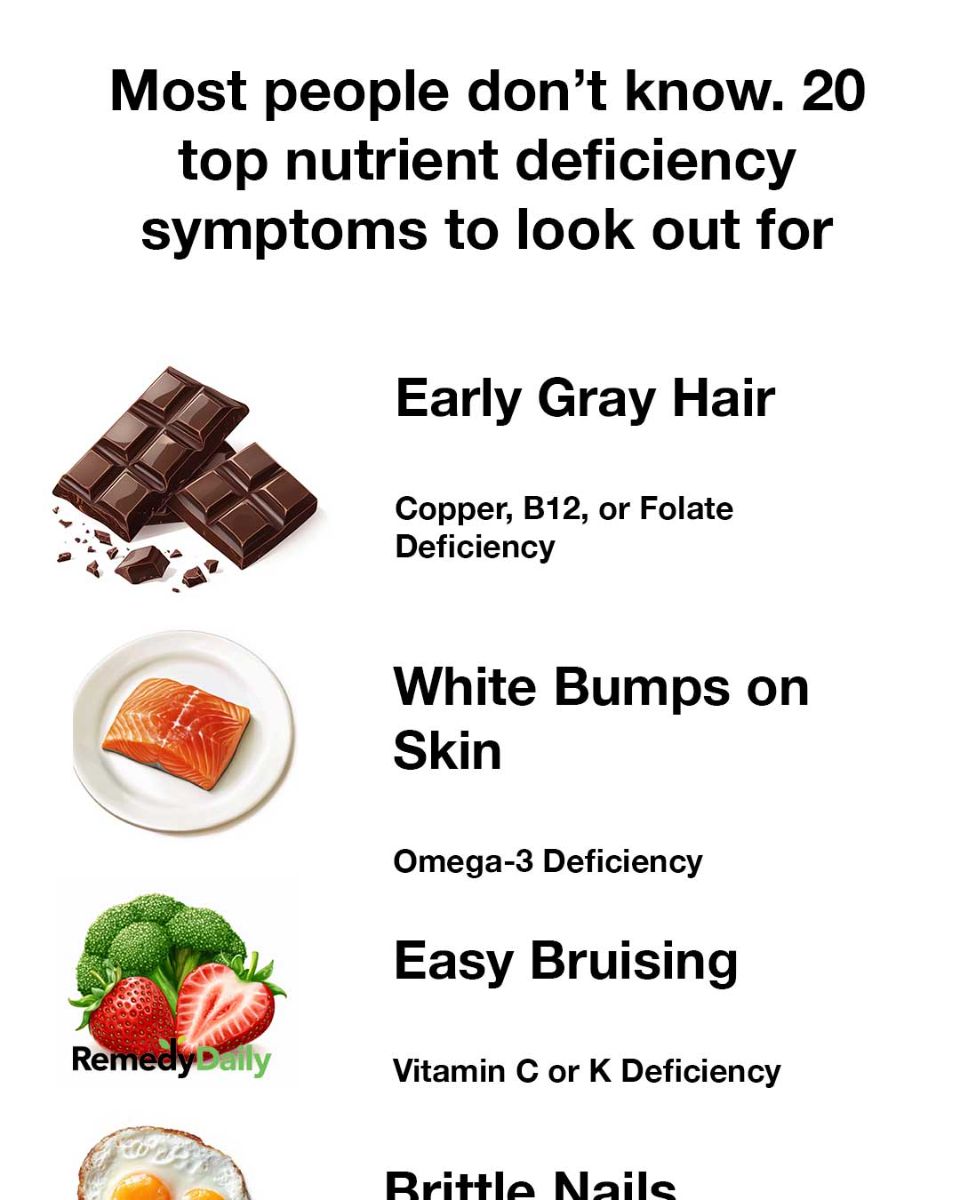Most people don’t know. 20 top nutrient deficiency symptoms to look out for
Nutrient deficiencies are more common than many people realize, often going unnoticed until they manifest as physical symptoms. These deficiencies occur when the body doesn’t get enough essential nutrients from the diet, which can lead to a variety of health issues. Understanding these deficiencies is crucial for maintaining overall health and preventing long-term complications.
Understanding the Importance of Nutrients
Nutrients are substances the body needs to function correctly, including vitamins, minerals, proteins, fats, and carbohydrates. Each nutrient plays a specific role, from building and repairing tissues to supporting immune function and energy production. A balanced intake of these nutrients is vital for maintaining health and preventing diseases.
How Nutrient Deficiencies Affect the Body
When the body lacks essential nutrients, it can lead to a range of symptoms and health problems. Deficiencies can weaken the immune system, impair cognitive function, and increase the risk of chronic diseases. Recognizing the signs of nutrient deficiencies early can help prevent more severe health issues.
Identifying Nutrient Deficiencies: Key Symptoms
Identifying nutrient deficiencies involves recognizing specific symptoms that indicate a lack of certain nutrients. These symptoms can vary widely depending on the nutrient involved and the severity of the deficiency. Being aware of these signs can help individuals seek appropriate dietary changes or medical advice.
1. Early Gray Hair: Copper, B12, or Folate Deficiency
Premature graying of hair can be an indicator of deficiencies in copper, vitamin B12, or folate. Copper is essential for melanin production, which gives hair its color. Vitamin B12 and folate are crucial for DNA synthesis and repair, which can affect hair pigmentation.
Eat:
Dark chocolate (rich in copper!) 🍫
Shellfish (especially oysters for copper)
Liver (high in B12 and folate)
Spinach and legumes (folate)
Eggs and dairy (B12)
2. White Bumps on Skin: Omega-3 Deficiency
Small, hard white bumps on the skin, often on the arms or thighs, can be a sign of omega-3 fatty acid deficiency. Omega-3s are important for skin health, and a lack of these essential fats can lead to keratin buildup, causing these bumps.
Eat:
Fatty fish (salmon, sardines, mackerel)
Chia seeds, flaxseeds
Walnuts
Omega-3-fortified eggs
3. Yellowish Skin: B12 Deficiency
A yellowish tint to the skin, known as jaundice, can be a symptom of vitamin B12 deficiency. This occurs because B12 is crucial for red blood cell production, and a deficiency can lead to anemia, which causes the skin to appear pale or yellow.
Eat:
Eggs, dairy
Fortified cereals
Beef, chicken, liver
Nutritional yeast (for vegans)
4. Easy Bruising: Vitamin C or K Deficiency
Frequent or easy bruising can indicate a deficiency in vitamin C or K. Vitamin C is essential for collagen production, which strengthens blood vessels, while vitamin K is necessary for blood clotting. A lack of either can lead to fragile blood vessels and increased bruising.
Eat:
Bell peppers, strawberries, citrus fruits (vitamin C)
Leafy greens like kale, spinach, broccoli (vitamin K)
5. Fatigue and Weakness: Iron Deficiency
Iron deficiency is one of the most common nutrient deficiencies and can lead to anemia, characterized by fatigue, weakness, and pale skin. Iron is crucial for producing hemoglobin, which carries oxygen in the blood.
Eat:
Red meat, liver
Lentils, beans, tofu
Spinach (with vitamin C-rich food to aid absorption)
Pumpkin seeds
6. Hair Loss: Zinc Deficiency
Zinc plays a vital role in hair tissue growth and repair. A deficiency in zinc can lead to hair loss and thinning, as the body prioritizes essential functions over hair maintenance when zinc levels are low.
Eat:
Oysters, crab
Pumpkin seeds, cashews
Chickpeas, lentils
Eggs
7. Brittle Nails: Biotin Deficiency
Biotin, also known as vitamin B7, is important for nail health. A deficiency can cause brittle, splitting, or soft nails. Biotin supports the production of keratin, a key protein in nails.
Eat:

Most people don’t know. 20 top nutrient deficiency symptoms to look out for
Pages: 1 2